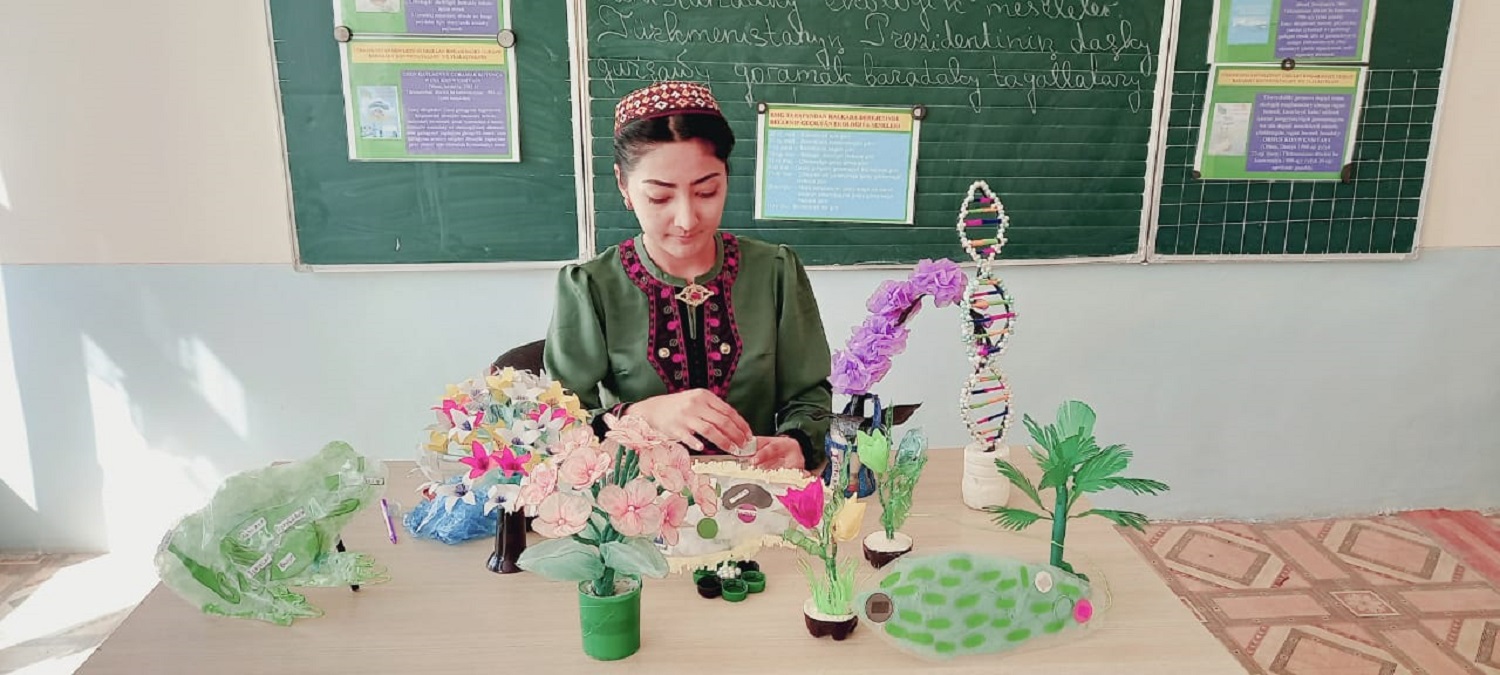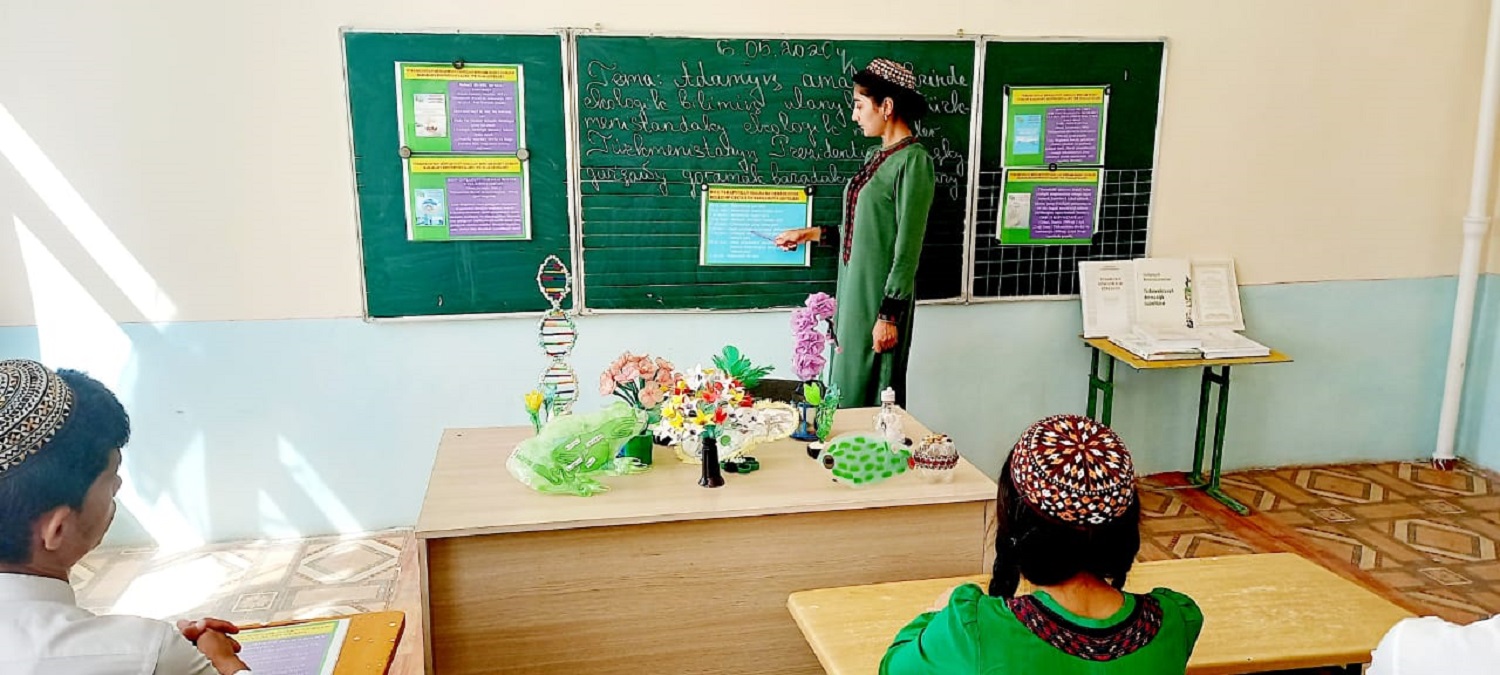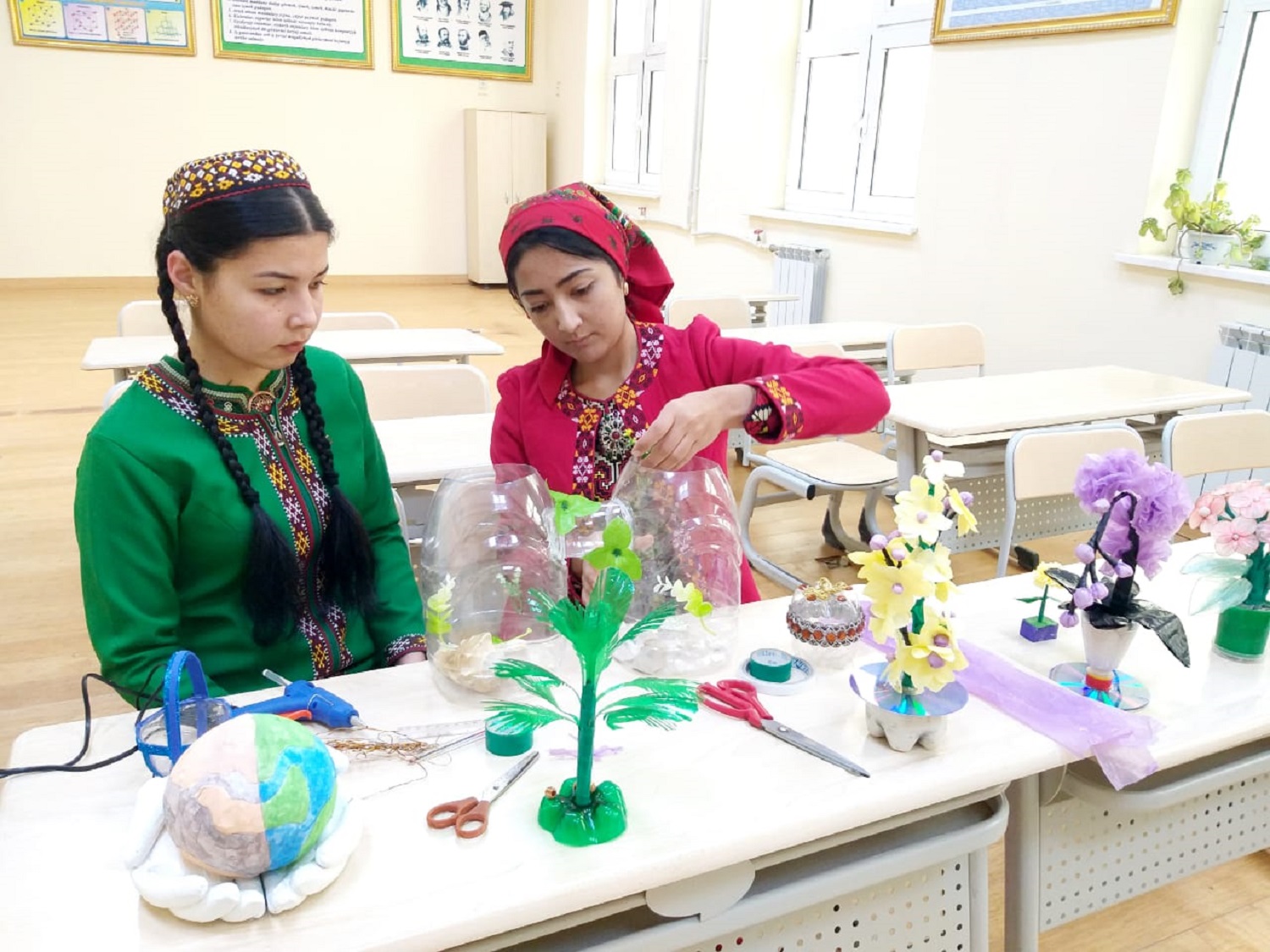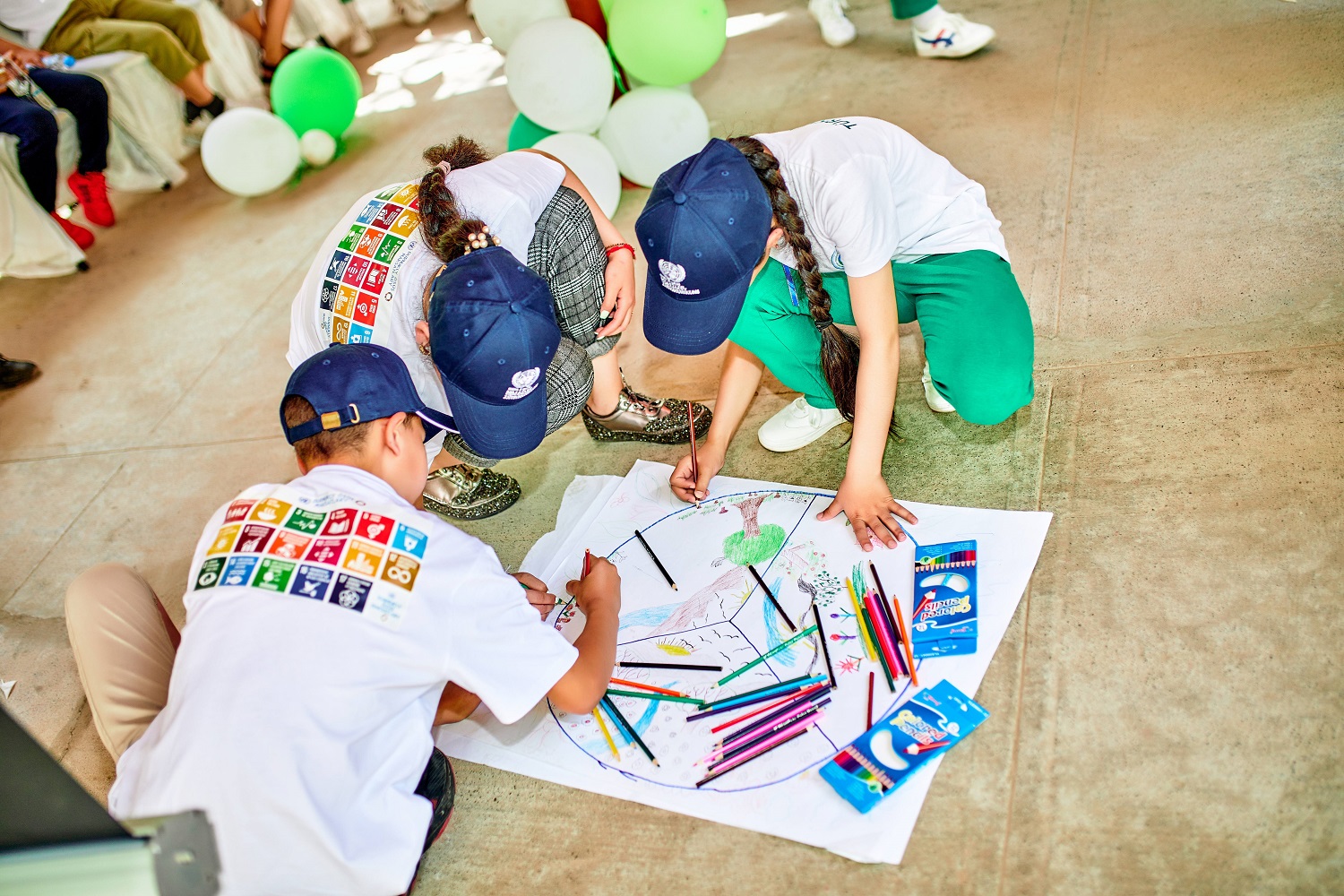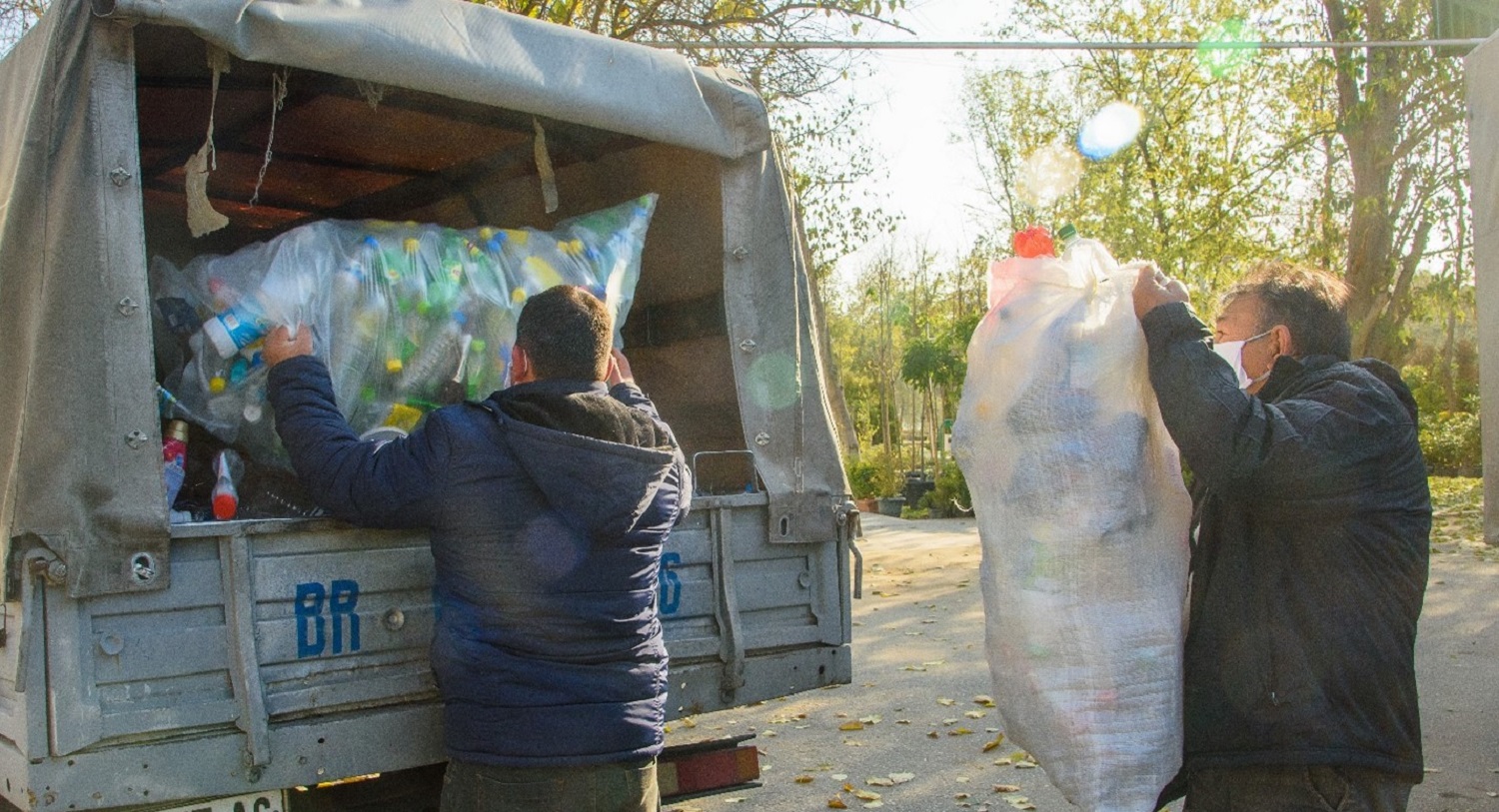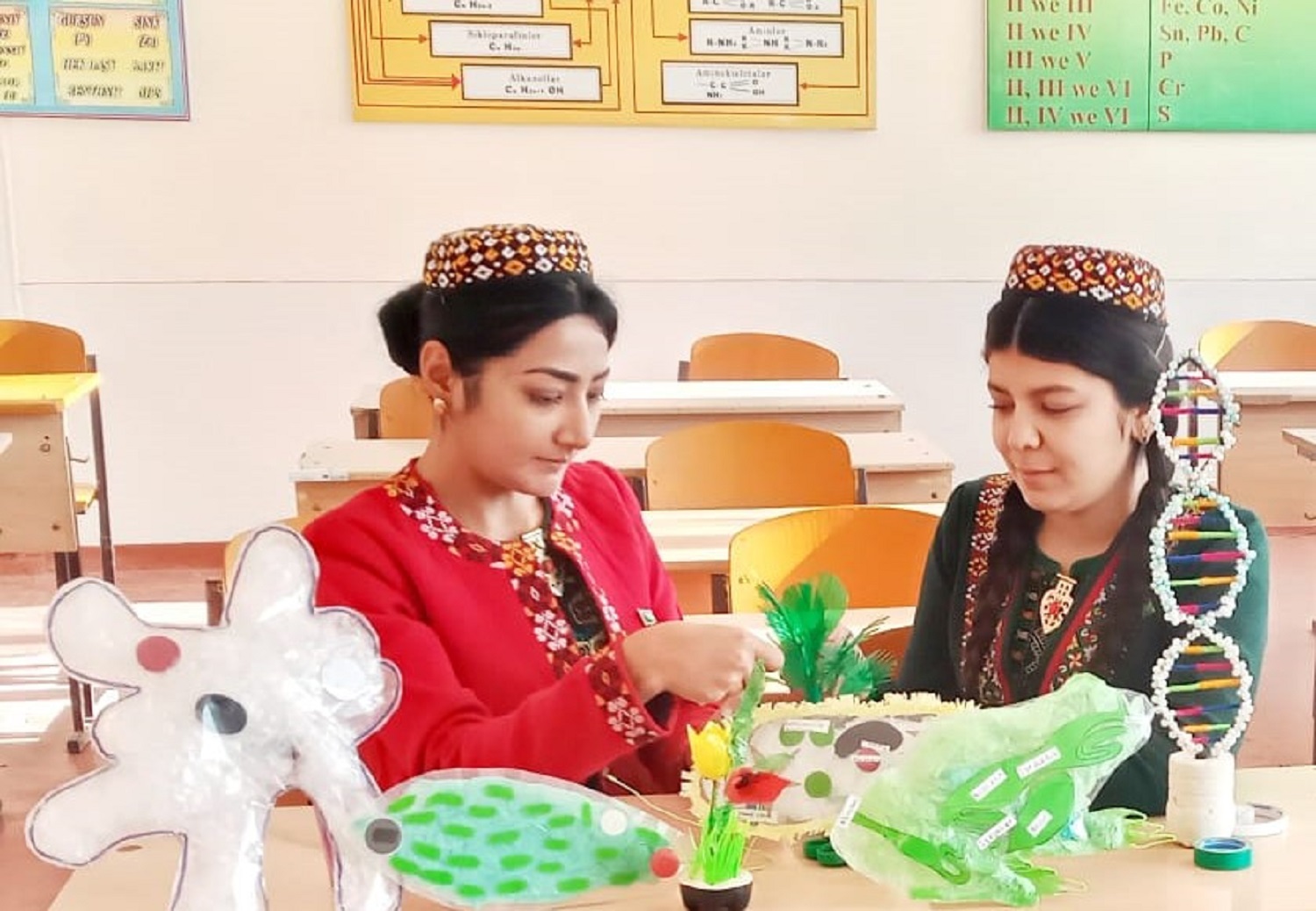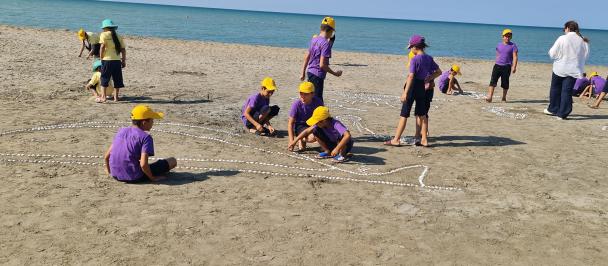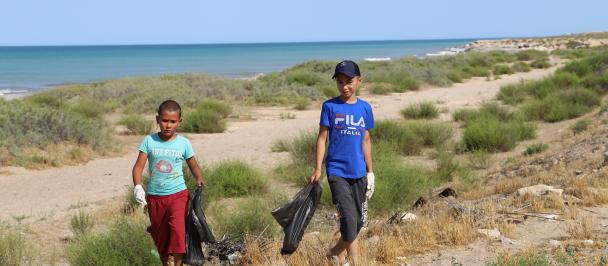At School Number 8 in Koytendag, Turkmenistan, a young teacher is explaining the structure of DNA and its role as a carrier of genetic information. An ordinary biology class in an ordinary Turkmen school. However, as you look closer, there’s something very unusual. All the educational visual aids of the classroom are made of plastic waste.
Mahliye Kurbanova teaches biology – the study of life and living organisms. Giving children in-depth explanations on the diverse forms of life, Mahliye often focuses especially on ecology, how living organisms interact with their environment. Through the context of science, she increases children’s knowledge and interest in learning about the environment and emphasizes their role in ecosystem restoration and environmental protection.
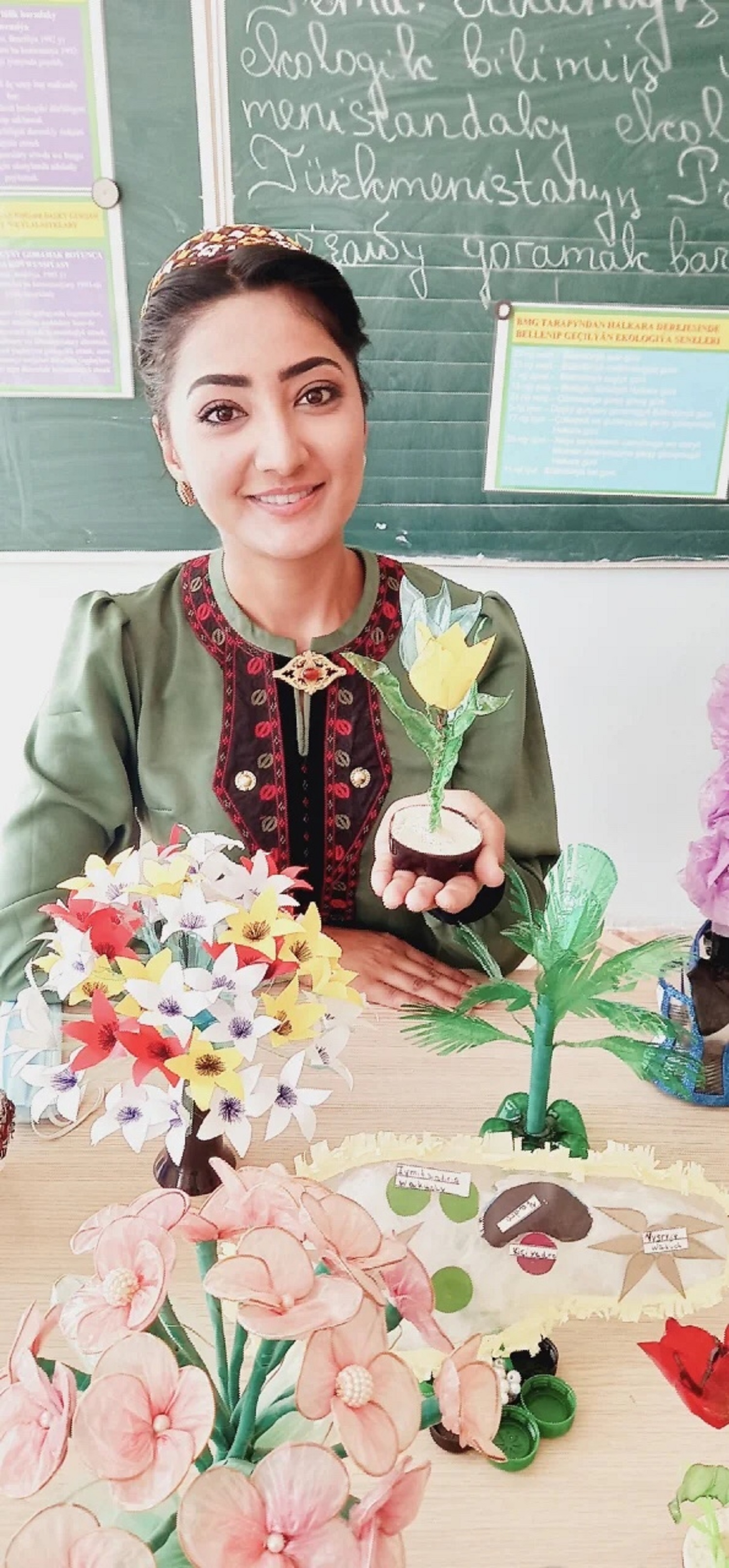 |
Together with her students Mahliye collects plastic waste from contaminated areas and turns them to DNA, human organs, amoebas, molecules, unicellular animals, vertebrates, and other illustrative material to supplement textbook learning and help students to grasp challenging scientific concepts. This hands-on experience not only helps students absorb the learning material, but also promotes behavioural change regarding rational consumption and waste management. Such teaching approach fosters students’ understanding of the purpose of reducing, reusing and recycling of plastic waste and helps them become responsible and caring members of their communities. |
. |
“People’s habits in relation to plastic consumption and production have led to a drastic increase of plastic waste all over the world. Plastic harms our environment and poses threat to our health”- Mahliye notes.
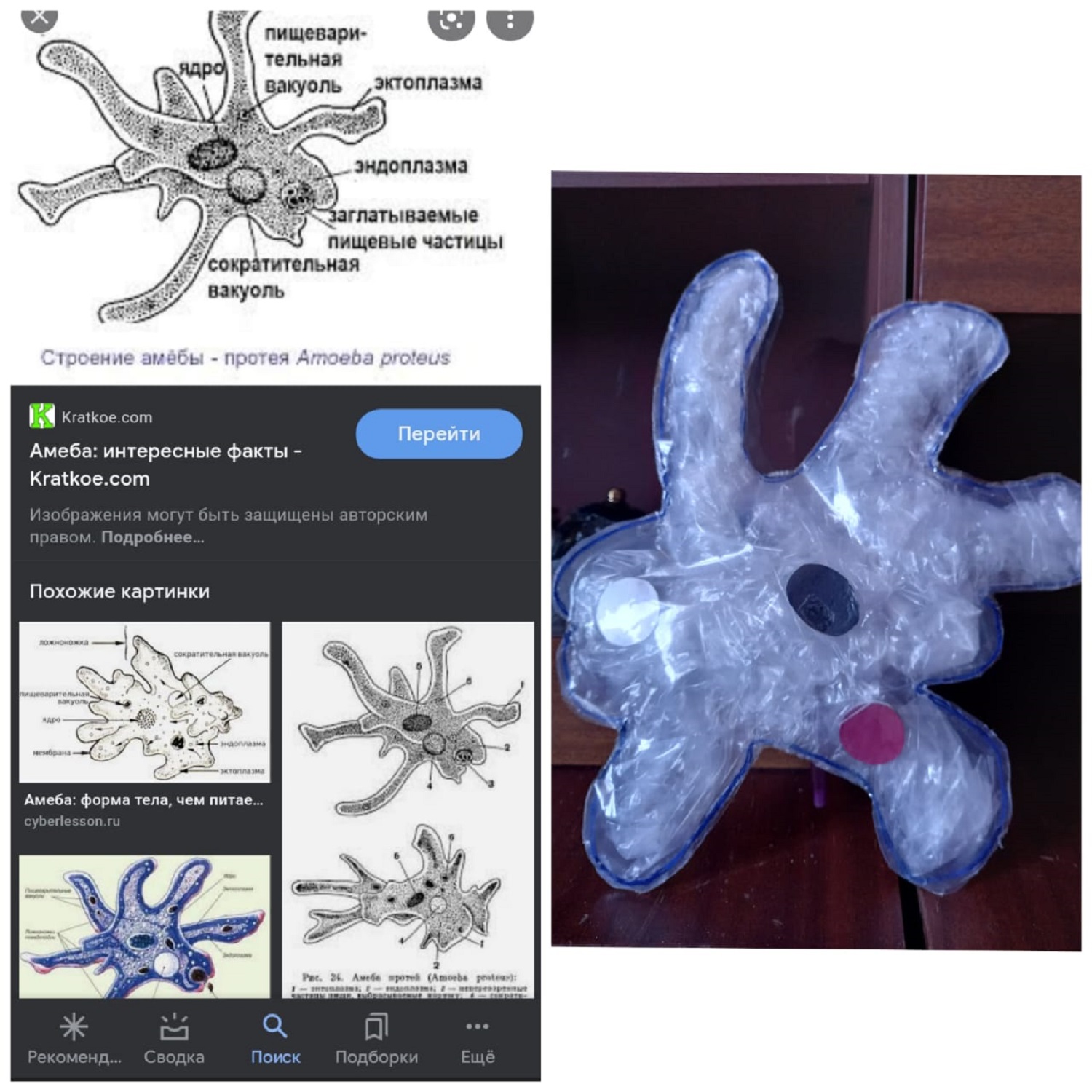 |
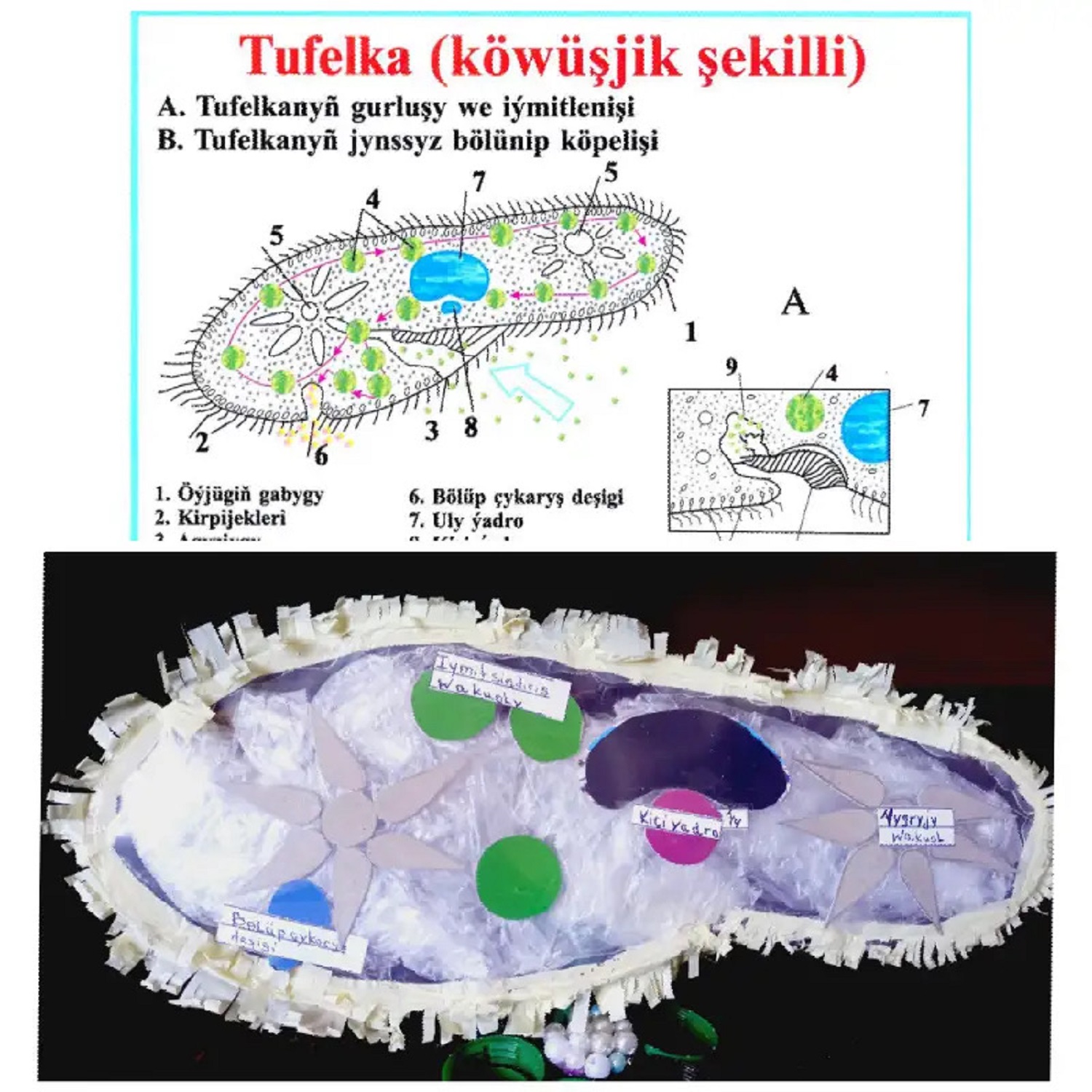 |
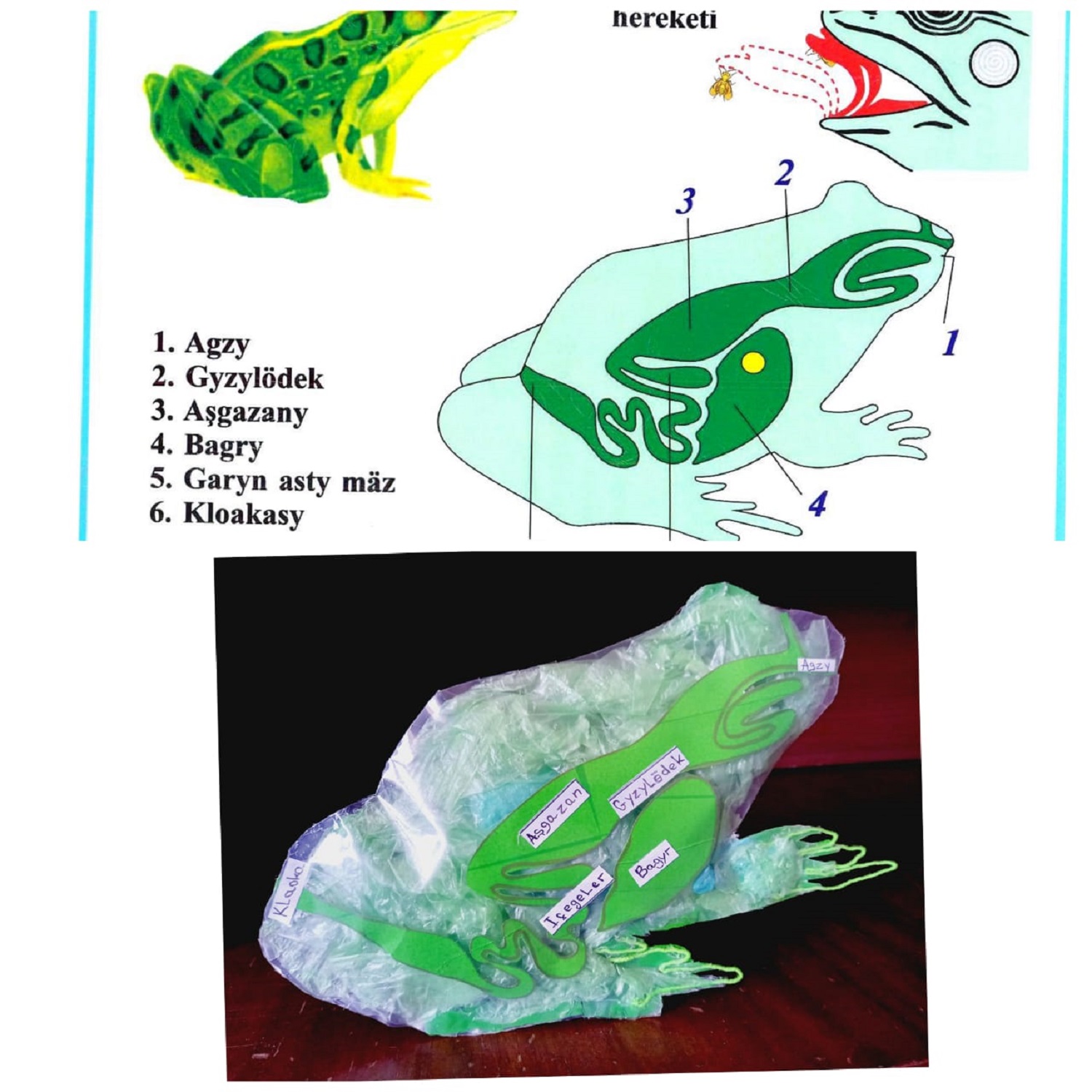 |
Photo: UNDP/The visual aid for the class of Biology in the School No 8 of Koytendag is made of plastic waste.
“Education plays an important role as it has the power to increase public awareness and knowledge and to promote environmentally favorable behavior to stop plastic pollution. Speaking about rational use of natural resources and engaging students in eco-friendly initiatives provides children with a chance of exploring their personal response to global environmental challenges.”
Photo: UNDP/A young teacher in Koytendag school teaching biology and cultivating passion about nature
In addition, within other eco-friendly school initiatives Mahliye runs the extracurricular activity “Green Belt” aiming to develop an ecological culture and promote a healthy lifestyle among students and their parents. To emphasize the importance of repurposing waste Mahliye and her students give a second life to the collected plastic waste turning them into beautiful flowers.
“We use discarded plastic bags and bottles collected from the polluted areas to create something useful and decorative”– she says.
Photo: UNDP/Mahliye and her student are focused on their work while turning plastic waste into flowers that now decorate the school.
Mahliye proudly mentions that Koytendag School No 8 attaches great importance to developing environmental culture and education:
“In line with the state educational policy aiming to ensure environmental well-being and educate young people in the spirit of respect for nature we often organize inspiring lessons on nature and the environment, keep our school clean by introducing cleaning days and teaching children how to handle waste to stop planet pollution.”
Mahliye and other schoolteachers regularly organize lessons on environmental education, focusing on deepening student’s connection to nature, increasing their environmental awareness and understanding of such issues as climate change and plastic pollution and helping them to start being green and smart in their daily lives.
Participation in the World Environment Day Public Information Campaign
This year, Mahliye actively participated and won the “What will YOU do to stop plastic pollution?” video contest hosted by the UN Agencies in Turkmenistan in the framework of the public information campaign devoted to the World Environment Day, 5 June.
As a result of the announced video contest, the UN Agencies received many fascinating videos demonstrating how individuals replace a plastic item with an eco-friendly alternative or suggest an idea of giving a second life to a single-use plastic product and reuse it to protect nature.
“This UN video contest provided an excellent opportunity for me to demonstrate our initiatives and highlight the importance of the environmental threats facing our world. The fact that I became a winner inspired me and motivated to continue and initiate other eco-friendly ideas” -says Mahliye speaking about the impact the contest had on her.
The Environmental education serves as the primary agent for social change towards sustainable development and paves the way for implementing the human development agenda. Within the same public campaign, the UNDP Country Office in Turkmenistan together with other UN colleagues held the educational session on environmental issues for children in “Altyn Damja” summer camp located in Gokdere.
Photo: UN/World Environment Day campaign: Children in “Altyn Damja” summer camp demonstrate the climate change in their drawings.
The event was organized by the Global Environment Fund (GEF)/UNDP Turkmenistan/Ministry of Agriculture and Environmental Protection of Turkmenistan project "Sustainable Cities in Turkmenistan: Integrated Green Urban Development in Ashgabat and Awaza” in partnership with other UN Agencies, Ministry of Education, Society of Nature Protection of Turkmenistan and young Turkmen SDG Ambassadors.
The activity aimed to raise ecological awareness among children and help them to start caring for nature, water resources and flora and fauna, as well as fostering a sustainability-oriented behavioral change.
This informal approach of increasing children’s knowledge on waste management often applied by UNDP experts allows children to entertain and have a fun, while learning and developing a sense of wise consumption and rational use of resources.
“The idea was in a game format to demonstrate children the threat plastic poses to our nature and our health, teach children environmentally friendly practices and make them understand that every little contribution counts in saving the planet” – said Jemal Durdykova, UNDP project specialist outlining the objectives of this educational activity.
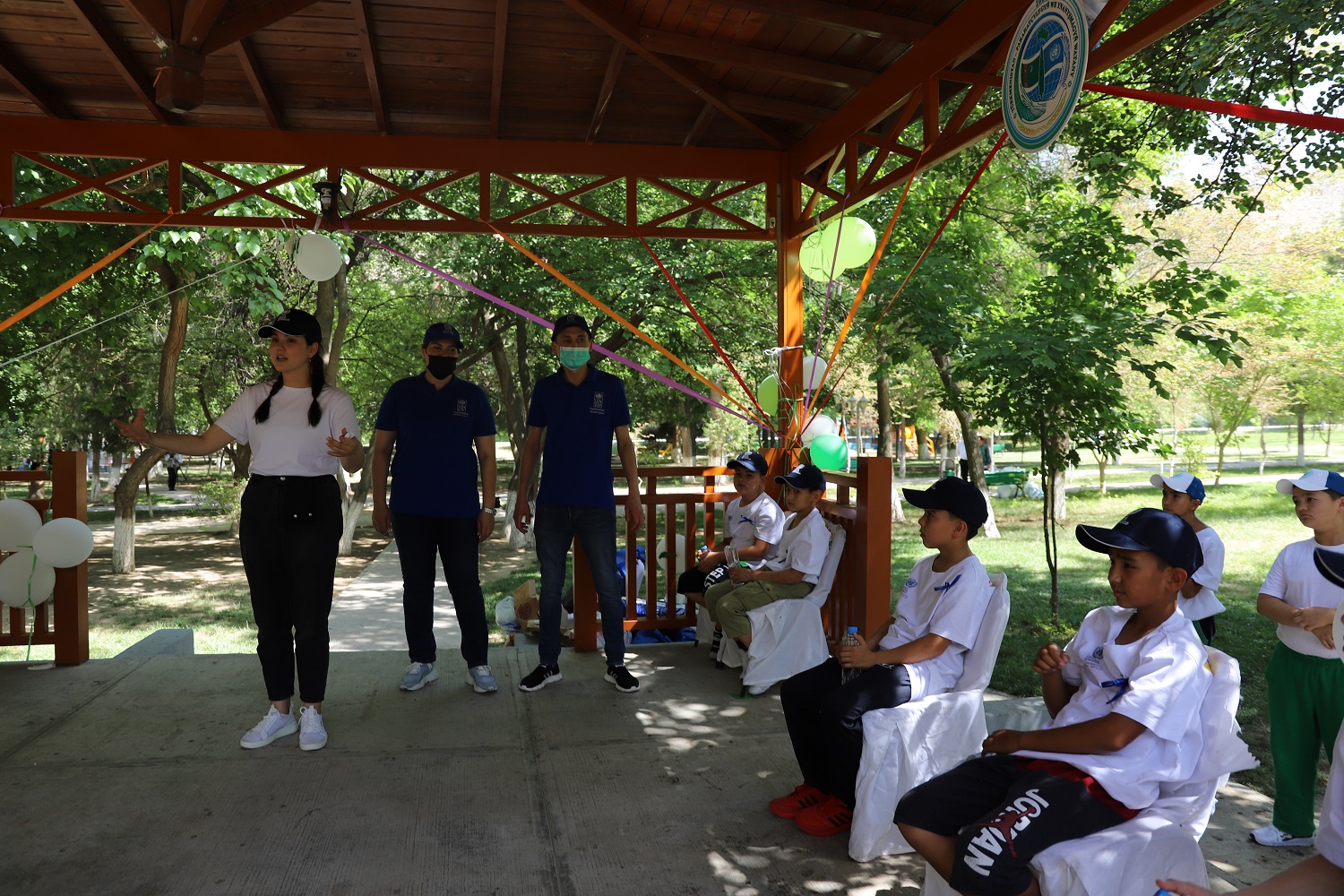
This Public Information Campaign was part of a range of ongoing UNDP initiatives supporting the national partners in their efforts to tackle the challenges of plastic pollution through changes in policy mechanisms, introduction of stronger monitoring systems, innovative initiatives and changes in consumer behavior.
Broader picture
Turkmenistan gives highest priority to the issues of climate change. Acknowledging the vital importance and urgency of addressing climate change issues in accordance with sustainable economic development, on a national and international level, Turkmenistan joined a number of UN Conventions on climate change and ratified Paris Climate Change Agreement to join the global efforts aiming to save the planet.
The UNDP Country Office has been closely working with the Government of Turkmenistan to provide support in achieving its national priorities to address the climate change issues, focusing on water and land pollution, reducing greenhouse gas emissions and greening populated areas to reduce the impact of air pollution, and implementing integrated low-carbon and climate resilient solutions.
Within the UNDP interventions in support to the Government of Turkmenistan in the area of climate change, the Country Office leads the process of developing the effective mechanisms for improving mitigation and adaptation capacities of the country. In close cooperation with the national partners UNDP provides support in the development of the National Waste Management Strategy of Turkmenistan and revision the existing regulatory and normative documents in the field of air and water resources management and monitoring.
Today, with the help of UNDP a large amount of plastic waste in the capital of the country is collected, sorted, and recycled. Last year the project organized the installation of recycling containers at educational institutions, parks and other public places, leading to the collection and further recycling of more than 50 tonnes of plastic waste. The campaign actively involved the public in plastic waste collection by offering them a tree seedling in exchange for 8 kg of plastic waste.
Photo:UNDP/ The “Sustainable Cities” project organize the collection of plastic waste in the capital of the country.
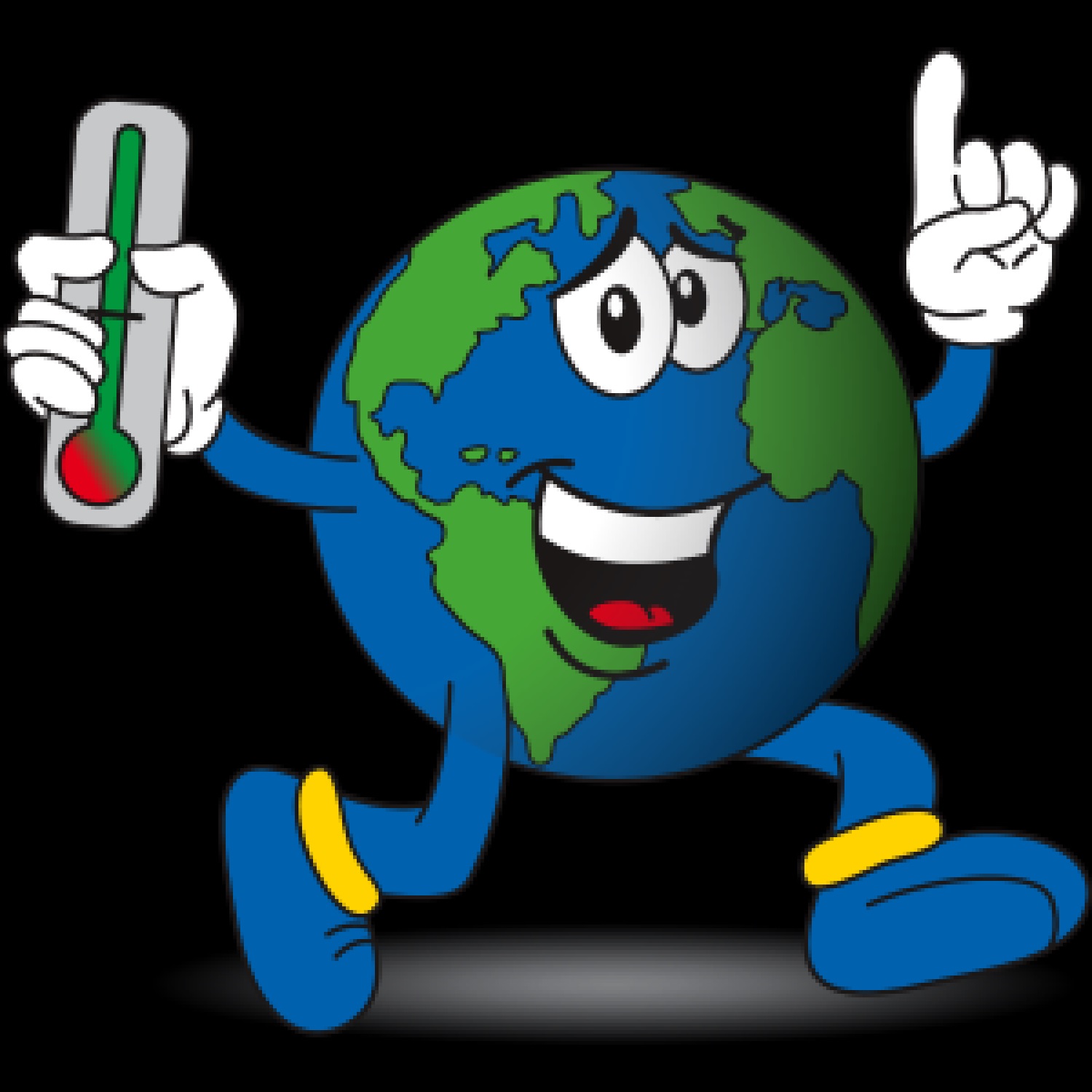 |
Recognizing the critical importance of environmental education, UNDP also introduced to the Middle school education curriculum the adapted to the country context version of Climate Box – a UNDP learning toolkit providing important information on global climate change in an interesting, interactive and entertaining way. The Climate Box national version was prepared and adapted with the Ministry of Education of Turkmenistan in the framework of UNDP regional project "Climate Box: Education and Awareness of Climate Change Issues", supported by the Russian Development Trust. |
More than 400 copies of Climate boxes have been distributed across the country. Hundreds of teachers were able to apply the acquired knowledge during the lessons of Ecology, Geography, History and Biology using interactive teaching methods and inspiring children to follow environmentally friendly lifestyle.
In addition, UNDP Country office constantly initiates a series of informal conversations to pursue knowledge and practices that can lead to a more environmentally friendly and ecologically responsible decisions and lifestyles. Such innovative initiatives help people understand the impact of human-caused pollution on people and ecosystem health and further boost discussions on how behavioral change towards sustainable lifestyle can lessen the problem.
On the way to change
Mahliye - our schoolteacher of biology is a young champion in promoting the ideas of rational use of natural resources, reasonable consumption and waste treatment through fund and engaging education. Mahliye inspires her students to start caring, get engaged and take an action introducing something very new for the local communities – promotion of environmental awareness and behavior change for nature.
Photo: UNDP/Mahliye teaching a student to repurpose plastic waste and promoting behavioral change.
“The actions of each person contribute to the protection and preservation of our planet. The behavior of each of us matters and adds value to the national and global efforts. Now, when humanity is very close to the planetary catastrophe, behavioral change is not just a choice anymore, but an obligation of all of us to become green and sustainable” – says Mahliye.

 Locations
Locations